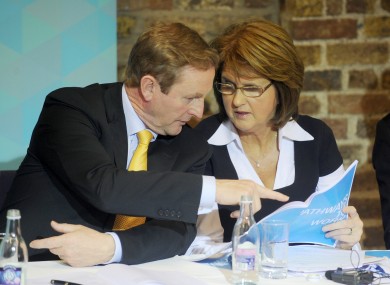Ireland eyes a gradual reversal of crisis cuts in public sector pay
Ireland’s Finance Minister Michael Noonan (R) stands with Minister for Public Expenditure Brendan Howlin as they present the budget to waiting media at the Government Buildings in Dublin October 15, 2013.
Ireland’s government will start talks next year with trade unions on the gradual reversal of public sector pay cuts that helped it overcome financial crisis, the spending minister was quoted as saying on Saturday.
Ireland’s coalition government won praise in Europe for meeting all major targets under the 85 billion euro (67.36 billion) EU-IMF aid programme it completed last year, but is under pressure at home to ease austerity measures.
Public spending minister Brendan Howlin said talks would begin next year on reversing some elements of the Financial Emergency Measures in the Public Interest Acts (FEMPI) which included a pension levy averaging 7.5 percent and a pay cut averaging 6.5 percent for public sector workers.
The acts were introduced between 2009 and 2013, after a property crash left the banking sector near collapse and dragged Ireland into the euro debt crisis.
“Next year, we certainly will have to engage with the unions on the orderly winding down of FEMPI and who should benefit first and how that should be done over time,” Howlin was quoted as saying by the Irish Independent newspaper.
“We have to have agreement with the public sector unions that it is not going to be a big bang, because that would undo all the good work we have done over three years. There has to be an orderly wind-down, as opposed to a sudden ending,” he said.
Howlin is a member of the junior coalition Labour party, which suffered a collapse in support in midterm elections in May.
New Labour party leader Joan Burton last week said the fact that the economy was growing faster than expected meant the government would be able to ease austerity measures when it sets its budget for 2015 in October.
The drunken Irish still struggle to beat demon drink
ALCOHOL CAUSES HUGE PROBLEMS IN IRISH SOCIETY, YET WE CONTINUE TO REMAIN IN DENIAL ABOUT ITS EFFECTS. DOES ANYBODY CARE?
By definition, a binge means more than six units of alcohol – that’s three pints. It’s a factual medical term, which relates to the fact that more than six units causes adverse physical effects. But when you say three pints is a binge to an Irish person, you almost always get the same response, “That’s not a binge!” Generally followed by description of climbing a crane, langers, in your underwear. In Irish terms, a binge is being legless. Twenty or 30 units can constitute a binge around here. We consider six units drinking in moderation. It’s not.
This latest study talks about our ‘collective denial’ of the issue, and, indeed, that’s the case. 1.3m harmful drinkers. Eight pc of the total health spend going on alcohol-related problems. A&Es ugly, violent places at night. Our major cities family unfriendly on our national saints’ day. Public disorder endemic on our streets after dark.
And yet we baulk at the ‘drunken Irish’ stereotype.
We go nuts when British politicians refer to it, and when we’re lampooned on The Simpsons. Irish doctors in the US campaigned to have a medical text book there changed – it suggested there should be a high suspicion of alcoholism in patients of Irish extraction. Collective denial.
We talk out of both sides of our mouths when it comes to alcohol in this country. On the one hand we say, “It’s a disgrace!” when we see people puking, urinating, fighting and copulating in the streets. And on the other hand, we continue to describe as ‘legend’, the mad nights out we’ve had when we were pissed.
We wonder why our young people drink like fish, while the older generations do the exact same. Only work, babies and age reign us in. And in women over 45 – whose children are no longer babies – we see drinking patterns increase once more.
So I think it’s time for debate. Is it actually worth it? Is all the havoc wreaked, worth the night out, that you cut loose and lived to tell the tale – of stealing a Garda’s hat and throwing up in your handbag? Because that’s the issue. The madder the tale, the funnier the story – the more we frame it as having a good time. The more we perpetuate the drink culture.
The fact is that alcohol is implicated in three quarters of suicides. And it is the single biggest risk factor for death in young men under 30. It is also a factor in countless rapes, assaults and accidents. It sucks up a huge amount of our health budget, while sober patients lying in wait on trolleys continue to be ignored.
So let’s have the debate and please let’s keep the drinks industry out of it. Let’s decide if it’s worth it. Because while we still talk about it like it’s cool – despite other nations thinking we’re basically drunks – it’s never going to change.
Railing against the drunken Irish stereotype while lauding the nights we were most pissed, says we want to continue this pattern of drinking but just don’t want anyone to notice.
If we really do want to change our relationship with drink, drunkenness has to stop being cool and become, in fact – like in many countries – uncool and unacceptable. Drunk tanks might be a good place to start. It’d clean up our streets, and ending up in one might be harder to eulogise.
OTHER NATIONS CAN SEE WE’RE DRUNKS.
SUCK IT UP LIKE YOU’RE IRISH: We baulk at the ‘drunken Irish’ stereotype. We complain when British politicians refer to it, and we went nuts when we were lampooned on ‘The Simpsons’
Isn’t it time we had a grown up debate about alcohol? Recently, yet another study has shown that we Irish drink far in excess of other countries. It says that 1.3m of us have a harmful drinking pattern and that 75% of our episodes of drinking constitute a binge. In other words, we don’t drink to add pleasure to a meal, or oil the social machinery. Ireland drinks to get drunk.
Ireland’s ‘Free’ GP care will come with a fee for every doctor’s visit


New health Minister Leo Varadkar is planning a small fee for every visit to the doctor under his free GP care plan – to prevent abuse of the system and clinics being overwhelmed.
The fee has yet to be set, but would act similarly to the prescription charge, which serves as a deterrent to patients getting unneeded medicines.
But the fee would not apply to patients already on a medical card or a GP-only medical card.
The free GP scheme is being rolled out for the under-sixes, followed by the over-70s.
But these categories are also expected to be exempt from any fee. From there, the Government plans to extend the scheme to primary and secondary school children.
Ultimately, the entire population will be covered. But the minister has not put a timescale on everybody having free GP care.
Talks are continuing with the doctor’s unions and the Irish Medical Organisation about the free GP care.
Mr Varadkar’s spokesman said the details had yet to be finalised on the size of the fee.
“No decision at all has been taken on this matter. Talks are continuing with the IMO.
“We want to ensure that anyone with health concerns can access GP services. We are especially aware that the under-sixes and over-70s have particular needs.
BREAKING
“But we do not want services to be overwhelmed and we don’t want people with legitimate concerns to find that GP services are struggling to cope.
“That may require a very modest charge but no final decision has been taken on that matter,” the spokesman said.
Ireland is unusual as three in five of the population do not have access to GP or primary care as part of the
State’s healthcare system.
Nominal fees have been used in other countries which provide universal GP care.
The possibility of a small fee was first suggested by former Junior Health Minister Alex White and others.
Last week, Mr Varadkar said he was delaying the introduction of the Government’s controversial plan to reform the health insurance system and end the two-tier service.
But the Health Minister said free GP care remains a priority, but he separated the universal health care aspects from Universal Health Insurance.
“Personally, I think we need to get Universal GP and Primary Care right and show people that it works,” he said.
Spar South Africa has entered into an agreement to buy an 80% stake in the BWG group for €55m.


BWG owns Spar in Ireland and services more than 1,100 stores with annual revenues of €1.2bn.
Its brands here include Spar, EuroSpar, Mace, ValueCentre and XL and it has 35% of the Irish convenience store market.
Spar South Africa is a wholesaler and distributor to over1,800 independent retailers spread across Southern Africa with annual sales of around €3.5bn and a market capitalisation of approximately €1.5 billion.
Today’s announcement also secures a further reduction in BWG’s borrowings following a buyback of exiting banks’ debts. This further reduction in debt comes on top of that achieved as part of a successful refinancing concluded in November 2013, which also saw BWG agree new five year banking facilities.
These facilities have been reaffirmed by BWG’s lenders as part of this transaction with Bank of Ireland and AIB increasing their commitment, the company said today.
The new partnership will have up to €100m to invest in the expansion of BWG’s leading wholesale and convenience retailing operations over the next five years.
Zoo animal trainer awarded masters’ degree for research into sea lion’s whiskers


Alyx Milne, 27, combines her work at Blackpool Zoo with her MSc studies at Manchester Metropolitan University
An animal trainer at Blackpool Zoo has become the first person to be awarded a masters’ degree for her research …. into sea lion whisker’s.
Alyx Milne, 27, has been fascinated by the mammals ever since she went on holiday as a five year-old to SeaWorld in Florida.
Now working at Blackpool Zoo, Alyx combined her work as an animal trainer and presenter, with her MSc studies at Manchester Metropolitan University.
Her dissertation on the motor neuron abilities of sea lions’ whiskers, which she said are so sensitive they pick up vibrations in the water to help them find fish, earned her a distinction from the university.
And because hers is the first masters’ degree research into the subject – her sea lion whisker paper is being featured in the Comparative Physiology Journal.
Today, M/s Milne, from Liverpool, said: “From the moment I was splashed by a killer whale while visiting SeaWorld, Florida, I knew that I was going to be a ‘Shamu’ trainer one way or another.
“Working with the sea lions at Blackpool Zoo has been a major part of my research.
“I’m so pleased I have something so great to show for it.”
It is already widely known that sea lions are tactile mammals. Their whiskers contain nerve fibers, which make them sensitive.
They may use their whiskers to aid in navigation or to detect vibrations from prey in the water.
M/s Milne is now aiming for a PhD relating to marine mammals.
California sea lions belong to the family Otariidae which means “little ears.” In the scientific community, there are many debates concerning the ancestry of eared and true seals.
Some scientists believe that eared seals and walruses may have evolved 30 million years ago from bear-like creatures in the North Pacific, and that seals evolved from otter-like carnivores in the North Atlantic.




No comments:
Post a Comment